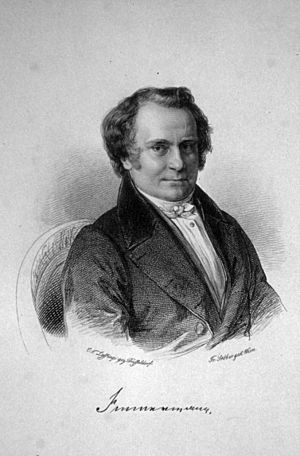Karl Immermann facts for kids
Karl Leberecht Immermann (born April 24, 1796 – died August 25, 1840) was a German dramatist (someone who writes plays), novelist (someone who writes novels), and a poet (someone who writes poems). He is known for his plays and novels that helped shape German literature.
Contents
Early Life and Education
Karl Immermann was born in Magdeburg, Germany. His father was a government official. In 1813, Karl began studying law at the University of Halle. However, his studies were interrupted when Napoleon's army took control of the area.
Military Service
When Frederick William III of Prussia called for people to join the army in 1813, Immermann quickly responded. He was sick and couldn't join the first battles. But in 1815, he fought in important battles like Ligny and Waterloo. After these battles, he marched into Paris with General Blücher.
Career as a Judge and Writer
After the war, Immermann went back to his studies at Halle. He later became a legal assistant in Magdeburg. In 1819, he was appointed as a judge in Münster in Westphalia. While there, he met Elise von Lützow. She encouraged his writing, and his early plays show her influence.
In 1823, Immermann became a judge in Magdeburg again. Then, in 1827, he moved to Düsseldorf to work as a district judge. Elise von Lützow also moved to Düsseldorf. In 1839, Immermann married a granddaughter of August Hermann Niemeyer, a well-known university leader.
Theatre Management
In 1834, Immermann took on a new role: managing the Düsseldorf theatre. Even with limited money, he managed to make the theatre very successful for two years. He helped it become a high-quality place for performances. However, the theatre didn't have enough funding to continue at that level. So, in 1836, he returned to his duties as a judge and focused more on his writing. He passed away in Düsseldorf.
Literary Works
Immermann had a great talent for writing plays. His early plays were not very well-known and are mostly forgotten today. However, in 1826, he wrote Cardenio und Celinde, a love story that showed more promise. Another writer, Count Platen, criticized some of Immermann's early works.
Between 1827 and 1832, Immermann wrote several important historical plays. These included Das Trauerspiel in Tirol (1827) and Kaiser Friedrich II. (1828). He also wrote a series of three plays about Russian history called Alexis (1832). His most famous play is the poetic mystery Merlin (1831). This play, like the famous Faust, explores deep questions about life and spirituality.
Immermann's work as a novelist is also very important. He is seen as a writer who bridged the gap between the Romanticism literary movement and more modern literature. His novel Epigonen (1836) is considered one of the last Romantic novels inspired by Goethe's Wilhelm Meister. On the other hand, his second novel, Münchhausen (1838), was different. It used satire and realism, which was a new style for the time.
One of Immermann's best-remembered prose works is a story about village life called Der Oberhof. This story is actually part of his larger novel Münchhausen. His last work was an unfinished epic poem titled Tristan und Isolde (1840).
See also
In Spanish: Karl Leberecht Immermann para niños
 | Kyle Baker |
 | Joseph Yoakum |
 | Laura Wheeler Waring |
 | Henry Ossawa Tanner |


